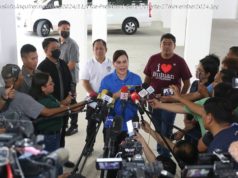Christine Blasey Ford’s testimony before the Senate Judiciary Committee has left Judge Brett Kavanaugh’s Supreme Court nomination on life support. From the moment she started…
Christine Blasey Ford’s testimony before the Senate Judiciary Committee has left Judge Brett Kavanaugh’s Supreme Court nomination on life support. From the moment she started to speak, this was a bloodbath for Kavanaugh, the White House and the 11 Republican members of the committee.
In my 30 years as a prosecutor and lawyer, I have never seen a more credible witness than professor Ford. It’s not simply that the key details of her account hung together and that she provided the types of rich particulars that truthful witnesses provide, such as the second front door she insisted on in her home out of residual fear from the attack. Or that her account was supported by pre-nominaton statements from third parties (such as her therapist) and her own polygraph. Or that it comports with the key documentary evidence we do have.
It was, in a word, Ford’s demeanor.
The whole reason for the jury system is our recognition that there is no substitute for seeing witnesses tell their stories in person. We are innately skilled at judging the veracity of witnesses in live setting. Thursday’s hearing was a teaching moment in that principle.
Ford was clear-eyed and aiming to please in response to questions from all sides. She was fully human and seemingly ingenuous. She was not angry or overwrought. She was nervous — “terrified” in her words — but determined. She was moved to the point of tears, and at times beyond, when senators offered testaments to her courage. (Just that detail, the near tears, was breathtakingly genuine.) She was, more than anything, completely resolute on the key detail that her attacker was Judge Kavanaugh.
The Republican senators’ strategy of cowering in the background while leaving the questioning to sex crimes prosecutor Rachel Mitchell backfired sharply.
Mitchell, understandably, applied a kid-gloves approach while clearly trying to chip away at Ford’s version of the event. But it was evident that far from a friendly or nonpartisan inquisitor, she was a hired hand for the silent Republican majority and was trying to catch Ford in a minor inconsistency.
More: I’m from Kavanaugh’s elitist world. I know how prep-school privilege buries secrets.
Rep. Kuster: Kavanaugh’s character is top concern for sexual assault survivors like me
Don’t judge Kavanaugh accusers. I covered the police and didn’t report my own rape.
The effort fell flat, in part because of Chairman Charles Grassley’s insistence on a five-minute clock for all senators and for Mitchell. She pursued ineffective cavils about Ford’s fear of flying or who paid for the polygraph, after which the next Democratic senator in line would return to broader themes: Ford’s courage, the need for a more comprehensive investigation, the common reactions of sexual assault victims, the hearing as a job interview for Kavanaugh and not a crucible for Ford’s veracity.
The Republican senators were mostly ashen-faced and stunned into silence. Those who did speak outside the room, principally Grassley and Sen. Lindsey Graham, complained bitterly about the political process. They obviously felt they had been outmaneuvered if not completely mowed down by a #MeToo freight train. Their dyspepsia came across as out of touch, and missing the broader point of the human drama of Ford’s experience.
It was also ironic in light of the raw political manipulation by Republicans, with their one-vote Senate majority, to try to push Kavanaugh’s nomination through without the investigation for which the situation screams out.
By the time Judge Kavanaugh settled into the witness chair about 3 p.m., his task was nearly impossible. He and his defenders had opted since the Ford allegations emerged to take an absolutist stance: that Ford’s claim was 100% fabricated, and that he had been a choir boy in high school and beyond. Hemmed in by these prior accounts, Kavanaugh once again denied all. He seemed more interested in defending his savaged character than salvaging the nomination.
Judge Kavanaugh’s approach was reminiscent of what Clarence Thomas did before him: He was hotheaded and angry, toward everyone in the process but in particular Democrats, whom he charged had orchestrated a smear campaign against him. At times, he appeared irate at the sour turn his once-assured nomination had taken. And like Ford, he was notably emotional, moved to tears repeatedly in his opening statement when discussing his family.
Kavanaugh’s composure came and went. When asked why he did not agree to an immediate FBI investigation, he pounded the table and fairly screamed that he wanted to come to the committee the next day. He then added the Republican talking point that the FBI doesn’t draw conclusions — which in no way argues against a fact-finding mission by the FBI.
The contrast to Ford could not have been more evident. Her story was certainly no less harrowing, but she came across as trying to be helpful while he seemed personally indignant. On the one hand, it was an indication of his sincerity, but it also transformed him into something like the entitled angry figure that his opponents have suggested.
His exchange with Democratic Sen. Patrick Leahy, for instance, quickly devolved into a shouting match during which Kavanaugh accused Leahy of trying to mock him. He essentially ducked Leahy’s questions about ribald entries in his high school yearbook and about his friend Mark Judge, whose absence hovered over the hearing.
Above all, the hearing showcased the rawness and human devastation of the process, on both Ford and Kavanaugh. But at the political level, it also was apparent that the White House and Republican committee members erred seriously in refusing to allow an FBI investigation when the allegations surfaced.
The questioning left Kavanaugh’s supporters with only the narrowest channel of defense: that his very anger was testament to his sincerity and created a standoff with Ford that could only be resolved by giving him the benefit of the doubt.
Start
United States
USA — mix Christine Blasey Ford testimony was bloodbath for Brett Kavanaugh, Trump and Republicans






